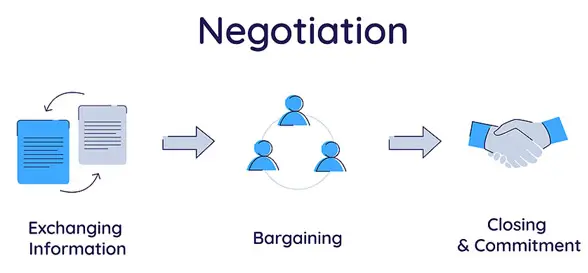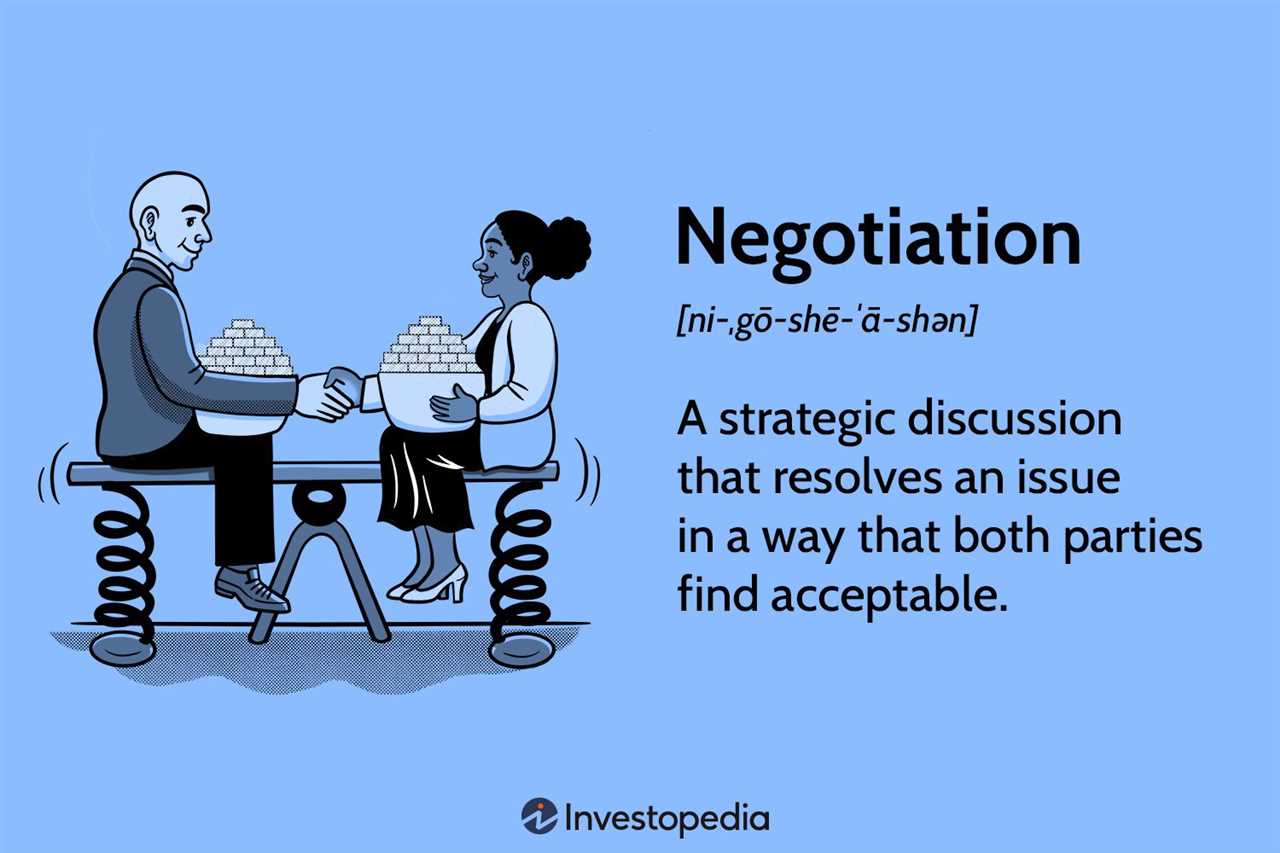Learn the Basics of Negotiation and Its Importance in Business
Negotiation is a fundamental skill in the business world. It is a process of reaching an agreement or compromise between two or more parties with different interests or objectives. In business, negotiation plays a crucial role in various aspects, such as sales, contracts, partnerships, and resolving conflicts.
Another critical aspect of negotiation is the ability to identify and create value. This involves finding mutually beneficial solutions that satisfy the interests of both parties. By exploring different options and considering various alternatives, negotiators can find creative solutions that maximize the outcome for both sides.
Negotiation is also about managing emotions and maintaining a professional demeanor. Emotions can often influence decision-making and lead to irrational behavior. Being able to control emotions and stay composed during the negotiation process is crucial for achieving favorable outcomes.
Lastly, negotiation is not just about winning or getting the best deal. It is about building relationships and fostering long-term partnerships. By focusing on creating value and maintaining a cooperative approach, negotiators can establish trust and credibility, which can lead to future business opportunities.
Negotiation: Stages of the Process
1. Preparation
The first stage of negotiation is preparation. This involves gathering information, setting goals, and developing a strategy. It is important to research and understand the other party’s interests, needs, and potential alternatives. Additionally, setting clear objectives and determining the desired outcomes will help guide the negotiation process.
2. Discussion
During the discussion stage, the parties involved in the negotiation engage in open communication. They exchange ideas, present their positions, and explore potential solutions. Active listening and effective communication skills are essential during this stage. It is important to maintain a respectful and collaborative atmosphere to foster productive discussions.
3. Clarification of Interests

4. Bargaining
Bargaining is the stage where the parties make concessions and negotiate the terms of the agreement. They engage in give-and-take, making offers and counteroffers. This stage requires effective negotiation skills, such as persuasive communication, problem-solving, and the ability to find mutually beneficial solutions.
5. Closure
The closure stage involves reaching a final agreement. This includes finalizing the terms, documenting the agreement, and ensuring both parties are satisfied. It is important to review and clarify any ambiguities or uncertainties before closing the negotiation.
6. Implementation

After the negotiation is closed, the implementation stage begins. This involves carrying out the agreed-upon terms and monitoring their execution. It is important to establish mechanisms for resolving disputes and ensuring compliance with the agreement.
Explore the Different Stages Involved in Successful Negotiation
Once preparation is complete, the next stage is the opening. This is where the negotiation actually begins, and it is important to establish a positive and productive tone from the start. Opening statements should clearly articulate your position and interests, while also allowing for the other party to do the same.
Once the exploration stage is complete, the negotiation moves into the bargaining stage. This is where both parties make offers, counteroffers, and concessions in an attempt to find common ground and reach a mutually beneficial agreement. It is important to be flexible and creative during this stage, as well as to maintain a focus on the overall objectives.
Finally, the negotiation moves into the closing stage. This is where the agreement is finalized and any necessary documentation is completed. It is important to ensure that all parties are satisfied with the final agreement and that any remaining details or concerns are addressed before concluding the negotiation.
Negotiation: Essential Skills for Success
Successful negotiation requires a set of essential skills that can help you achieve your goals and reach mutually beneficial agreements. These skills are crucial for any business professional who wants to excel in negotiation. Here are some key skills that you should develop:
- Communication: Effective communication is at the heart of successful negotiation. You need to be able to clearly articulate your ideas, listen actively to the other party, and ask relevant questions to gather information. Good communication skills can help you build rapport, understand the other party’s perspective, and find common ground.
- Problem-solving: Negotiation often involves finding solutions to complex problems. Developing strong problem-solving skills can help you identify creative options and propose innovative solutions. Being able to think critically and analytically will enable you to navigate through challenges and find mutually beneficial outcomes.
- Emotional intelligence: Emotional intelligence refers to the ability to understand and manage your own emotions and the emotions of others. It is crucial in negotiation because emotions can greatly impact the outcome. By being aware of your emotions and those of the other party, you can better control the negotiation process and find win-win solutions.
- Flexibility: Negotiation often requires flexibility and adaptability. Being open to different perspectives and willing to explore alternative options can help you find creative solutions and reach agreements that satisfy both parties. Flexibility also involves being able to adjust your strategy and tactics based on the evolving dynamics of the negotiation.
- Assertiveness: Assertiveness is the ability to express your needs, interests, and boundaries in a clear and confident manner. It is important in negotiation because it allows you to advocate for your interests while maintaining respect for the other party. Being assertive can help you overcome obstacles, address conflicts, and achieve mutually beneficial outcomes.
Develop the Key Skills Needed to Excel in Negotiation
Successful negotiation requires a set of key skills that can help you excel in any business or personal situation. These skills are essential for achieving mutually beneficial outcomes and building strong relationships with your counterparts. Here are some key skills you need to develop to excel in negotiation:
1. Communication: Effective communication is crucial in negotiation. You need to be able to clearly express your ideas, listen actively to the other party, and understand their perspective. Good communication skills also involve asking the right questions and using appropriate body language to convey your message.
2. Problem-solving: Negotiation often involves finding solutions to complex problems. Developing strong problem-solving skills will help you identify creative options and generate win-win solutions that meet the needs of both parties. This skill requires critical thinking, analytical skills, and the ability to think outside the box.
4. Flexibility: Negotiation requires flexibility and adaptability. You need to be open to new ideas, willing to compromise, and able to adjust your approach based on the changing dynamics of the negotiation. Being flexible allows you to explore different options and find common ground with the other party.
5. Preparation: Preparation is key to successful negotiation. You need to thoroughly research and gather information about the other party, their interests, and their negotiation style. Being well-prepared will give you confidence, help you anticipate potential challenges, and enable you to make informed decisions during the negotiation process.
7. Persuasion: Persuasion skills are crucial in negotiation. You need to be able to present your arguments convincingly, address objections, and influence the other party’s decision-making process. Effective persuasion involves using logical reasoning, providing evidence, and appealing to the other party’s interests and values.
By developing these key skills, you can excel in negotiation and achieve successful outcomes in various business and personal contexts. Remember, negotiation is not just about winning, but about finding mutually beneficial solutions that can lead to long-term partnerships and collaborations.

Emily Bibb simplifies finance through bestselling books and articles, bridging complex concepts for everyday understanding. Engaging audiences via social media, she shares insights for financial success. Active in seminars and philanthropy, Bibb aims to create a more financially informed society, driven by her passion for empowering others.
